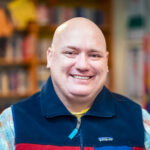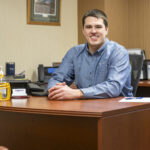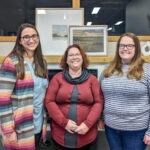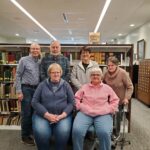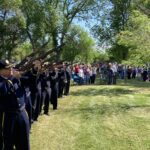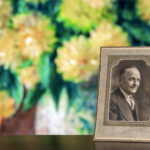

A closer look at the places and faces that make up Aberdeen
For years, thousands of people around the world have been coming to America to pursue their dreams and build a future. Some came by boat, forced by necessity to pack their bags and flee their homeland in pursuit of a safe place their families could call home. Others came by plane, seeking enrichment and new opportunities on fresh soil. Even though Aberdeen is a relatively small community, it too has been host to people from all pockets of the globe, each with their own unique perspectives on the world and stories to share. As time moves forward and Aberdeen continues to grow, the community is beginning to welcome more and more fresh faces, diversifying our cultural makeup and enhancing our identity as a place for people from all walks of life to thrive. In order to celebrate this convergence, Aberdeen Magazine was able to get up close and personal with just a few of the friendly faces of those that now call Aberdeen home.
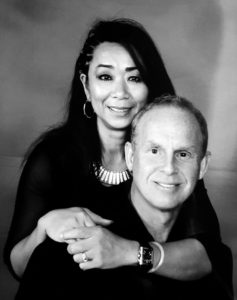
Ericka Hunstad and her husband Jem Hunstad.
Ericka Hunstad, Home country: Laos
“No one puts their children in a boat unless the water is safer than the land.” These words, written by poet Warsan Shire, rings especially true for Ericka Hunstad and her family of eight who fled Laos in search of safety. Ericka, also known as Thuy Tran, was only 10 years old when the Vietnam War threatened her hometown of Vietiant in 1975. Her father, who was the mayor of the town at the time, arranged for 32 people to sneak out on canoes by way of the Mekong River and into Thailand. From there, Ericka and her family jumped out of a plane in order to travel to the Philippines. Finally, after several months of living in military bases, her family arrived at Camp Pendleton in California and moved to Aberdeen after being sponsored by the Zion Lutheran Church.
When asked about her escape, Ericka said the hardest thing was simply not knowing. “At the time I just didn’t know any better than to do what I was told,” she explained. “I wasn’t even sure where I was going or what would happen.”
Upon their arrival on American soil, Ericka’s family didn’t know what to expect. Adjusting from a tropical climate to the drastic seasonal changes of South Dakota was more than a little jarring at first, and although they knew French and had studied 4-5 different languages, they hadn’t had the opportunity to fully learn English yet. On top of it all, the food and people were totally different. To Ericka, it was like a whole different world. “You get out of the airplane and look at these people, and they’re pretty, white, and tall. We are dark and little. You guys are like monsters to us,” she laughed.
Not long after the family settled down, Ericka’s father got a job working as a tailor at Jorgenson’s men’s shop, which used to be on Main Street. Starting in fifth grade, Ericka attended Howard Hedger, where she excelled at math. When she applied for citizenship at 18 years old, she also decided to change her name, citing the fact that it would be easier for jobs and travel. Since then, she has made a living for herself as an accountant and is currently raising a family of her own.
Ericka said that her experience of Aberdeen has been mostly positive because it’s smaller, easier to get around, and she and her family don’t face as much discrimination as they might somewhere else. “Here, you co-mingle with everybody,” she said. However, that doesn’t mean they have not encountered it. “It still happens to us. Just because you’re different, and you talk different, and dress different. We got teased quite a bit growing up. It is hurtful, but how do you get past that? It even happens to our kids. You just have to know that people like to be treated how you’d want to be treated.”
Since she left, Ericka has been back to visit relatives in Thailand and still keeps in touch with many of her other relatives that fled with her family and that now call Rapid City and Minnesota home. In the future, she hopes to eventually move somewhere south she where can spend ample time at the beach.
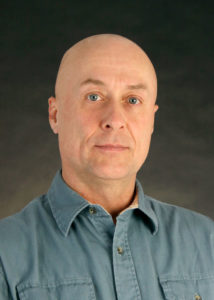
Andzrej Duszenko has served as a professor of English and Literature at NSU since 1989.
Andrzej Duszenko, Home country: Poland
According to Andrzej Duszenko, “You truly don’t know who you are and where you came from until you have lived somewhere else.” This pursuit for knowledge and a broadened worldview led him from his home in Wroclaw, Poland all the way to Southern Illinois University at Carbondale and eventually to Northern State University, where he has served as a professor of English and literature since 1989.
While Andrzej was working on his Master’s in Poland, he already had a firm idea that he wanted to leave the country, explore, and live somewhere else. Poland was still under communist rule at the time, and around the time he graduated, tensions began to escalate. People began to strike against the puppet government run by Russia, coming out in the streets and saying, “Enough – we aren’t going to take it anymore.” Since Russia had previously invaded Hungary and Czechoslovakia, Andrzej began to fear it was only a matter of time until they did the same to Poland. “I had this feeling of urgency to escape a political situation that was going to lock me in unless I got out quickly,” he said.
In fact, that is exactly what happened. A few months after he left, Poland declared martial law, preventing anyone from leaving the country. At first, Andrzej had no idea where he was going. He spent half a year in England and another half a year in Brazil before applying for a Ph.D program at the Southern Illinois University at Carbondale. He had heard about the program from a professor that had come to see the musical theatre group he was a part of at the University of Wroclaw; the group was called ‘Why Not’ and produced plays in English.
Andrzej says he experienced the most culture shock upon first visiting England while still a student in Poland. When he left the country for the first time, he was used to a pervasive shortage of goods and services, typical of the communist-run economy. “The first few days when I was in London, I would walk around the streets looking at everything and wondering how different things were. I had to get used to the fact that there were all these stores with goods displayed in the windows, and you could just go in and buy anything you wanted,” he explained. “It was shocking.”
When Andrzej came to interview for a job at NSU, he instantly fell in love with the school. “I liked the people here. They seemed so friendly, honest, and open. I thought this school was a good fit for me; it was small, so I could get to know the students personally.” If he could change anything about Aberdeen, it would be the climate and the landscape, since he is used to the temperate weather and deciduous forests in Poland.
After leaving Poland, Andrzej was not able to return for nine years. When he came back, everything had changed. It was a free country, but in many ways it was still in ruins because everything had to be built from scratch after the communists were removed from power. “I can’t even describe what it felt like to be there and to walk the streets,” he recalled. “It was another culture shock, suggesting, once again, that to understand people and places one must have a point of reference.”
For this reason, Andrzej strongly encourages everyone to participate in some type of exchange program and live somewhere else for a while if they are able. “I think it’s an invaluable aspect of developing into a full person.”
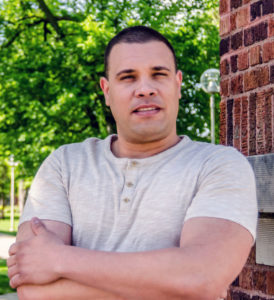
Armeris Tamayo has kept a very busy schedule between his job at Molded Fiberglass, business classes at NSU, and translating for the police and fire departments in his spare time.
Armeris Tamayo, Home country: Cuba
While he was living in Cuba, Armeris Tamayo often witnessed his parents helping people in any way they could and aspired to be like them. So when he moved to Miami, Florida four years ago and had to pay $300 for a translator, he knew he had to do something. Now, Armeris lives and works in Aberdeen, working as a production supervisor at Molded Fiberglass and volunteering his free time to translating for the local police and fire departments.
Although Armeris originally came to Miami to study medicine, he moved to Aberdeen to work at the Northern Beef Plant and transferred to Molded Fiberglass when that plant shut down. The president of the company helped him to return to school at Northern State University, where he switched his major to business due to his newfound interest in marketing.
When he first came to the US, Armeris struggled with speaking fluently in English. “It was difficult, but I was learning,” he said. “I knew that I needed to work more, and I wanted to keep getting better every time.” As he continued to improve, he noticed other people experiencing the same struggles that he did when he first moved here. One day, when Armeris witnessed a friend having trouble communicating with a police officer, he volunteered his services and realized he could continue to help many people in this way. Although the PD and fire department have translating services, sometimes they can’t fully translate for everyone. This is where Armeris comes in. “I say, every time you need me, you can call me. I can help you translate. Because of my culture and everything I know, I want to help people.”
Ameris’ goal is to move up within his company and continue learning whenever he can. “I’m hungry for knowledge,” he said. “I want to keep learning. That is my top interest right now. This past year I was working and studying every single day.”
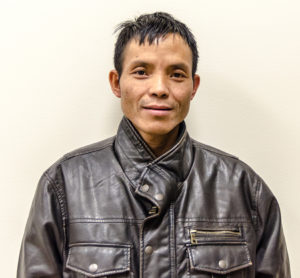
Sui Ling is making a living in Aberdeen as a production worker at Molded Fiberglass. He works so that his four kids, three of whom are in college and one in high school, can have better lives.
Sui Ling, Home country: Malaysia
For people whose home countries are plagued with war and strife, escape is often the only option. Sui Ling, a production worker at Molded Fiberglass, was forced to flee with his family from Malaysia to the US due to a civil war that threatened their lives.
Originally, Sui and his family settled in Utah for four months and then lived in Huron for three years. After that, he came to Aberdeen in search of better job opportunities, and has been here five years since.
Although the language barrier may occasionally make living in the US difficult for Ling, he says he feels lucky to live in Aberdeen. “There’s a lot of jobs here and there isn’t much traffic, so I can move to different locations very easily,” he explained. “I like it here because they provide so many opportunities for us like ESL classes, and the working environment is good.”
As he gets older, Sui’s number one goal is to provide for his family. He hopes to make enough money to help his kids get a better education and good jobs.
Most of all, Sui wants to live peacefully, away from the heavy war presence of his home country. “I want to live a peaceful life, I don’t want to argue with people,” he said. “I want to live free.”
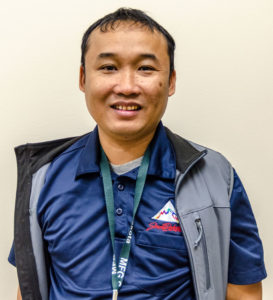
Stone Saw currently works as translator for the Karine and Burmese people employed at Molded Fiberglass. He only recently moved to Aberdeen, but has lived in the US for 12 years.
Stone Saw, Home country: Burma
Like many others, Stone Saw left his home country of Burma in search of a more fulfilling life away from the conflict of the civil war. He has been in the US for a total of 12 years, most of which he has spent living in upstate New York with his family.
Stone only recently moved to Aberdeen after he visited a friend here and decided to apply for a job at Molded Fiberglass. Currently, he is working as a translator, and assists all of the Burmese and Karen people with communication on the job.
Although the US is quite different from Burma, Stone said the only difficulty he has had to face is the language barrier, which hasn’t proved to be too much trouble since he has received ample help. “You come here, and everyone helps each other,” he said. “In Burma it’s different. I came here with empty hands. A lot of agencies and people helped me find a job and apply for benefits. This has really helped me and my family a lot.”
Stone likes Aberdeen because it’s quiet, not too big, and not too small. “There’s no crime, and I never hear the ambulance at all. The neighborhoods are very nice,” he said.
In the near future, Stone is planning on visiting his family who are still located in New York. Regardless of how far he has to travel for work, his number one goal is to be a good father to his children.
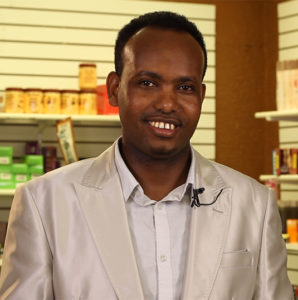
Ahmed Yussuf owns the African Grocery and Coffee Shop, located by the Salvation Army. The shop stocks a variety of foods and spices that can’t be found anywhere else, and also serves as a gathering place for many community members.
Ahmed Yussuf, Home country: Somalia
For Ahmed Yussuf, America is a land ripe with work and business opportunities. That’s why he packed his bags and left his home in Somalia four and a half years ago to live in a new, unfamiliar place. He came to Aberdeen over six months ago to work at the beef plant, and has since opened up the African Grocery and Coffee Shop and was elected to serve as the leader of the Somalian community in Aberdeen.
The idea for a grocery store and coffee shop came after Ahmed noticed that Somalian community members had no access to the foods they were used to eating at home. His shop carries a wide variety of meat, drinks, creams, and spices that can’t be found anywhere else in the area.
In addition to providing a variety of unique food items, Ahmed’s shop also serves as a central gathering place for African community members. “They like to get together to talk and play games here,” he said. “We love sharing.” In the future, he hopes to expand his business even further.
According to Ahmed, Aberdeen is a great place for him and his people to thrive. “I like Aberdeen because there are lots of jobs, there are people I can form a community with, and the work here is better than work I had in the past,” he explained. “The people who live here help us a lot, and they are good people.”
When he first came to the US, Ahmed said he had to spend some time adjusting at first. Because he learned English in Africa, he had to get used to the way things were said in America since the accent is completely different. But with education and help from community members, Ahmed believes anyone can be successful. “We have a lot of people who are learning the English language and getting GEDs, and at the same time they are working too. There is no Somalian person who stays in Aberdeen without work. The majority of us have multiple jobs.”
Ahmed highly encourages any new members to the community to contact him if they need any help. He is always happy to offer advice, provide more information about ESL classes, and help people find translators.
Above all, Ahmed is most excited to share Somalian culture with Aberdeen. “We look forward to learning more about your culture as well as sharing ours with you,” he said. //–Becca Simon

